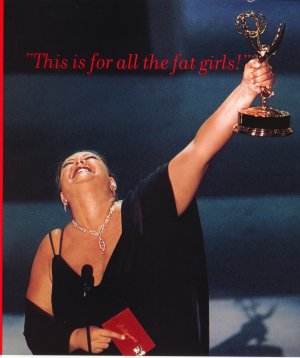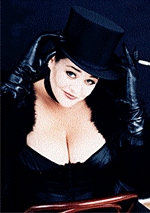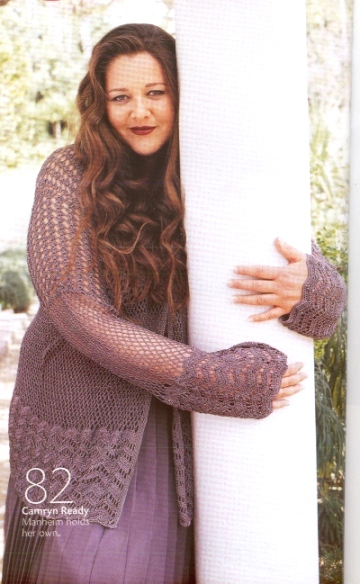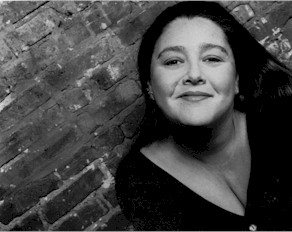|
|
|
 |
Camryn Manheim |  |
|
One Cool Chick |
|
|
|
|
| Camryn Manheim Bio Deborah Frances Manheim was born im Caldwell, New Jersey in 1961. She grew up in a reformed jewish household with her parents, Jerry, a math professor, and Sylvia, a teacher, in addition to her 2 other siblings. She had an older brother and an older sister. Although she was born in New Jersey, she was raised in Illinois and California. Deborah started gaining weight at the young age of 10, which was when she moved to California. Her parents tried to make Deborah lose weight. They had brought her to psychiatrists, hypnotists, and they bribed her. When working on her masters degree at New York University's Tisch Drama School, she dropped 80 lbs in 9 months with the help of Speed, an illegal amphetamine, and became the darling of the drama department. When she graduated, the roles stopped coming her way. When Deborah did an over dose of drugs, she realized that she needed to get her life on track. When she stopped using Speed, she gained all of the lost weight back again. When her father suggested that she start up again to lose the weight, Deborah didn't speak to him for a year. Now called Camryn, she wrote a play titled "Wake up, I'm Fat". The show reflected a series of Camryn's experiences as a fat person in an unaccepting society. A few weeks before the show aired, she was cast in "The Road to Wellville". When a casting executive saw the show, he reccomended Camryn to telivision producer, David E. Kelley, husband of Claudia Schiffer and producer of Ally McBeal, The Practice, and Chicago Hope. Camryn submitted a tape of her work to him, but Kelley thought she was too conservative. But they still scheduled the screening, and Camryn didn't get the part that she auditioned for, but yet had a part written especially for her as the potrayal of Ellenor Frutt on the telivision show called "The Practice". She also potrayed Ellenor Frutt in a cross-over episode of Ally McBeal, in which the first segment of the show was featuring "The Practice" cast at the Cage & Fish lawfirm as outside counsel, and ended with the Ally McBeal cast on "The Practice"'s show. She has since won an Emmy and a Golden Globe for her portrayal of Ellenor Frutt on The Practice. |
 |
 |
Camryn's bio from: http://www.abc.com/primetime/the_practice/manheim.html Camryn Manheim has appeared in a long list of hit films, as well as television and stage productions. Her recent motion picture credits include "Romi and Michelle's High School Reunion," "Eraser," "Jeffrey," "The Road to Wellville," "Bonfire of the Vanities," "David Searching"; and "Wide Awake" with Rosie O'Donnell. On television, Manheim guest starred on "Chicago Hope," four episodes of "Law & Order," "Touched By An Angel," "New York Undercover," as well as the television movie, "Deadly Whispers," and the "ABC Afterschool Special," "Notes for My Daughter." A popular actor on daytime dramas, ÊManheim has appeared on such programs as "Loving," "One Life to Live" and "All My Children." A versatile and talented stage actress, Manheim starred in "Wake Up, I'm Fat," her own one-woman show at the Joseph Papp Public Theater in New York. She won a 1995 Obie Award for her performance in Craig Lucas' "Missing Persons" at the Atlantic Theatre Company. She is proud to have worked at such renowned theaters as the New York Shakespeare Festival, Lincoln Center, Yale Repertory, New York Theatre Workshop, Classic Stage Company, and Home for Contemporary Theater. The role of Ellenor Frutt was adjusted to reflect some of Manheim's personality, including the twelve earrings she wears in her right ear. In New York City where she lives, Manheim can often be seen riding her Honda CB650 motorcycle in the traffic, no matter what the weather. Manheim is also a sign language interpreter and holds an MFA degree from New York University, where she currently teaches. -------------------------------------------------------------------------------- Here's a few more tidbits, gathered from various sources the web: Camryn had crushes on Speed Racer and David Cassidy as a child. She has a pegasus tattoo on her ankle that she got in Rio (just so she could say she got a tattoo in Rio!). Her favorite musician is bluesman Keb Mo and she added, "I still live in the '60s, and listen to Neil Young, Joni Mitchell and Cat Stevens." Camryn also has said, "since I'm at the theater almost every night, I've become a late-night TV addict. David Letterman, Conan, Tom, etc. I love Ellen. Homicide. You know, the regulars." She was actually born Deborah Frances Manheim. She said, "I hated my name since I was a kid. Used to change it at camp every year. When I moved to New York, I decided to reinvent myself, and I changed it to Camryn." In addition to acting, her other loves include making pottery, swing dancing, and playing tournament-level bridge. Camryn rides a honda cb650. She also has commented, "I have 12 holes in my ear, and thats only because I met someone who had eleven. But the kudo's go to David Kelley for embracing what is unique about each of us instead of trying to make us fit some kind of norm. Isn't it cool? I'm in superior court, in the commonwealth of boston (a conservative state) with 12 holes in my ears." |
| Mode June 1999 How could anyone not know who Camryn Manheim is? With one groundbreaking statement - made from the heart - she was propelled into a new kind of spotlight, one that calls for her to be an educator as well as an actress. But in the midst of it all she has kept her perspective. hers is a refreshing honesty in a land often said to be populated by "plastic people". How does she do it? By remember what it took for her to get to this point. She didn't pop up out of nowhere and land her award-winning role on "The Practice". She persevered through bitter disappointments and rejections to get to the triumphs. And even an award or two is not going to cause her to rewrite history from a glossier perspective. Instead of just rejoicing at the recognition, Manheim thought it time to let people in on the stories behind her impassioned statement by writing her memoirs. The release of "Wake Up, I'm Fat!" is a signal that Manheim is feeling courageous enough to take all of us into her confidence. She carries us along on her very personal journey of "becoming" - thorough her childhood and her stint at the Renaissance Faire to her grueling graduate school experiences at NYU and her struggle to be recognized as an artist and actress on her own terms. |
 |
 |
Parade Magazine May 9, 1999 By: Gail Buchalter Camryn Manheim was surprised when she couldn't find roles because of her size. In her struggle to break through stereotypes of heavier people, she developed "warrior skills" and found a new personal freedom: I Am Who I Am. Camryn Manheim spent years dealing with negative attitudes toward heavier people. Today, at 38, she has achieved an Emmy Award for her role in The Practice, landed several movie roles and written a book, Wake Up, I'm Fat! None of it was easy, she says: "I fought for everything I've got." "Growing up fat in America is devastating," said Camryn Manheim. "I grew up without role models. I grew up with magazine and television images that told me my body was undesirable. I spent a lot of my life just waiting for it to begin--waiting to be thin." This year, Manheim, 38, won an Emmy for Outstanding Supporting Actress for her portrayal of attorney Ellenor Frutt in The Practice (which won for Best Dramatic Series). She was praised for her performance in Happiness, a film dircted by Todd Solondz, and this year she will appear in the film Joe The King as well as two TV movies. Manheim also has written a book of memoirs, Wake Up, I'm Fat!, based on her one-woman show of the same name, published by a division of Random House this month. Without shedding a pound, Manheim has made a name for herself as an actress. When she won her Emmy, she held it aloft and proclaimed, "This is for all the fat girls." I visited the actress at her home in one of L.A.'s quaint and pricey beach communities. Manheim--5 feet 10 inches and well over 200 pounds--was dressed in jeans and a sweatshirt as she led me into the living room. I wanted to know when she realized she was entitled to live a fulfilling, fruitful life--even if she is overweight. "Actually, I was a thin child," Manheim began. "Then I gradually put on weight. We had moved from Peoria, Ill., to Long Beach, Calif., where kids practically wore bathing suits to school. Junior high school was a scary place to be, so I gained weight to protect myself. I wasn't so fat that people stared at me, I just wasn't skinny like the girls next door. That way people easily dismissed me, and I could disappear into the woodwork." At home, Manheim was far from meek. "My parents taught me to think for myself early on," she said, adding that the family included an older brother and sister. "My father was a professor, and my mother was a schoolteacher. We had huge, confrontational arguments at the table about anything from politics to existential theory. My parents are true socialists, and one of the greatest gifts they gave me is the belief that all people are equal when going after the brass ring. I never thought I didn't deserve it." But as Manheim continued putting on weight, her parents' anxiety grew. "They took me to therapists and hypnotists," she recalled. "They bribed me to lose weight. They couched it in concern for my health, but they were concerned that they had a fat daughter." On the contrary, she said, she has always been physically healthy. These days she plays racquetball three times a week. "I have the type of body that was meant to work in the fields and have babies," she said. "The problem is people are programmed to hate fat people." Something of a free spirit, Manheim found a safe haven when she entered The School of Educational Alternatives in Long Beach. At 16, she worked at the Renaissance Faire, an arts and crafts fair whose participants wear period costumes. "Historically, the Rubens women represented the ideal," she said. "At the fair they celebrated bodies like mine." "I played guitar and sang," she added. "and people seemed to be enchanted. I had a better self-image at 16 than I would 10 years later." She even found a boyfriend--Adam the juggler. Manheim went on to earn a degree in theater arts from the University of California at Santa Cruz. She was accepted into New York University's master's program in 1983. A talented undergraduate, Manheim became unsettled once she began her graduate studies. "It never occurred to me that my weight would be a problem," she said. "I was 10 and thin when I decided to become an actress. Then I gained weight. Art is supposed to imitate life. There are fat people in the world, so shouldn't their be fat actors? At NYU everyone was incredibly talented--and I was fat. We formed a company, and I became the character actor, never the ingénue. It wasn't until my last play that this unknown director, Tony Kushner, insisted I play the [romantic] lead. I was terrified being kissed onstage. Now I'm fighting for it." Manheim laughed when she said the word "unknown," which Kushner no longer is, having won Tony Awards in 1993 and 1994 for Angels In America, which he wrote and directed. But it seemed to her that Kushner was the only one able to focus on Manheim's talent and not her size. "I was 25 and a drug addict," Manheim said. "I thought the only way I could be a professional [actress] was if I was skinny. I wanted to lose weight so badly I took crystal methedrine." It helped her drop 80 pounds. "Finally I overdosed at someone's house. They kept me in the hospital overnight for observation. I was mostly filled with shame and self loathing. I had beaten myself up so badly and was so fragile. I was suicidal." Manheim's crumbling self-image intensified when--unlike almost all of her classmates--she couldn't get an agent. Without one, a would-be actor is stuck in back of the herd. It took her five years to finally get an agent. During this time she began searching for ways to rebuild her life and self-esteem. She saw a therapist three times a week and took jobs that kept her close to the theater. She ushered at plays. She became a "reader," earning an hour reading lines with auditioning actors. She taught two classes at New York University. She also took an interpreter-training course at New York Society for the Deaf. Manheim already knew signing, which she had studied earlier in California. "I interpreted for five years," she said. "Even in the depths of despair, I was signing and involved in political activities. I interpreted for [former Gov.] Jerry Brown's camp and at gay-rights rallies. Somewhere I knew it was helpful, and I gained joy and confidence from it. I fought for everything I got and developed warrior skills. I have an 'I'll show you' attitude." She continued to act, although she rarely got paid. But in 1987, Tony Kushner cast her in a play, Hydriotaphia. She met his assistant director, Michael Mayer, and they became best friends. They've collaborated on nine mostly off-off-Broadway plays, including Manheim's 1995 Obie-winning performance in Missing Persons. Yet, she said, it wasn't the Obie that sparked a new attitude. Rather it was a message that arrived at precisely the right moment. "Someone sent me a card," she recalled. "It was a picture of a green light signal. It said, 'Wishing you blue skies and green lights.' Suddenly I realized that all my life I was waiting for my life to begin. At 10, I wanted to be 13; then 16, so I could drive; then 18, so I could vote; 21, so I could drink. I waited to get out of school, to get that great apartment, to find that great boyfriend. I was waiting to be thin, so I could write about what it was like to emerge the conqueror of my fat. "Then I thought, 'This is my body,'" she continued, her voice picking up intensity. "'I live in it, I play in it. I can't deny it anymore. This is my fat body. I'm standing at the corner of Life and You Better Get Going. I can either cross the street, or just keep waiting.' I stepped off the curb and never looked back." Manheim wrote a one-woman show, aptly titled Wake Up, I'm Fat!, an open and unabashed look at being fat that's crammed with funny, poignant and painful insights. She began performing it in 1993. "The show did exactly what Camryn wanted it to," said Michael Mayer. "More people began noticing her, and she became more confident. She always knew who she was, but she didn't always like who she was. She slowly learned to embrace the whole person." Hollywood was gradually waking up to her talents. She had a small role in Bonfire of the Vanities (1990) and a much larger part in The Road to Wellville (1994). But when it came to TV, she still found herself auditioning for "fat parts"--nurses, washerwomen and the friend next door. In a bold move, she decided to read for the part of an attorney on Law & Order--a man's part. She got it, and it was tailored to her. The Practice soon followed. The show provided both Manheim and her character, Ellenor Frutt, with opportunities to champion her cause for tolerance and change. She's the first woman her size, she said, to be romantically kissed on television. In a different episode, when a crazy client called Frutt "Hippo" and "Jumbo," she refused to turn the other cheek, as the script dictated. "Fat girls are always victimized," she complained. "I was just honored by the National Association to Advanced Fat Acceptance and the Western Law Center for Disability Rights, so I'm somewhat of an authority. I didn't want to make a big deal out of it, so I just called the client 'Psycho.'" "Camryn's a person who has stayed true to herself," observed Lara Flynn Boyle, also on The Practice and Manheim's friend of several years. "All her years of struggling are paying off. I've never seen anyone carry herself more confidently." Manheim said there was still one major area of her life that she wanted to change. "I want to have children," she explained, "but right now I'm not in a relationship. I'd love to be a biological parent, and I want my child to know it's father. I have some friends who I'm considering [as co-parents]. I'm thinking about entering into a negotiation with one of them. I plan on doing this soon. I haven't given up on being married, but I'm not going to wait for it. I don't want to wait for things I have no control over--like falling in love." She added with a big smile, "I much prefer living my life every moment." |
| |
 |
|
|
|
| |
|
|
|
|
| |
|
|
|
|
| |
|
|
|
|
| |
|